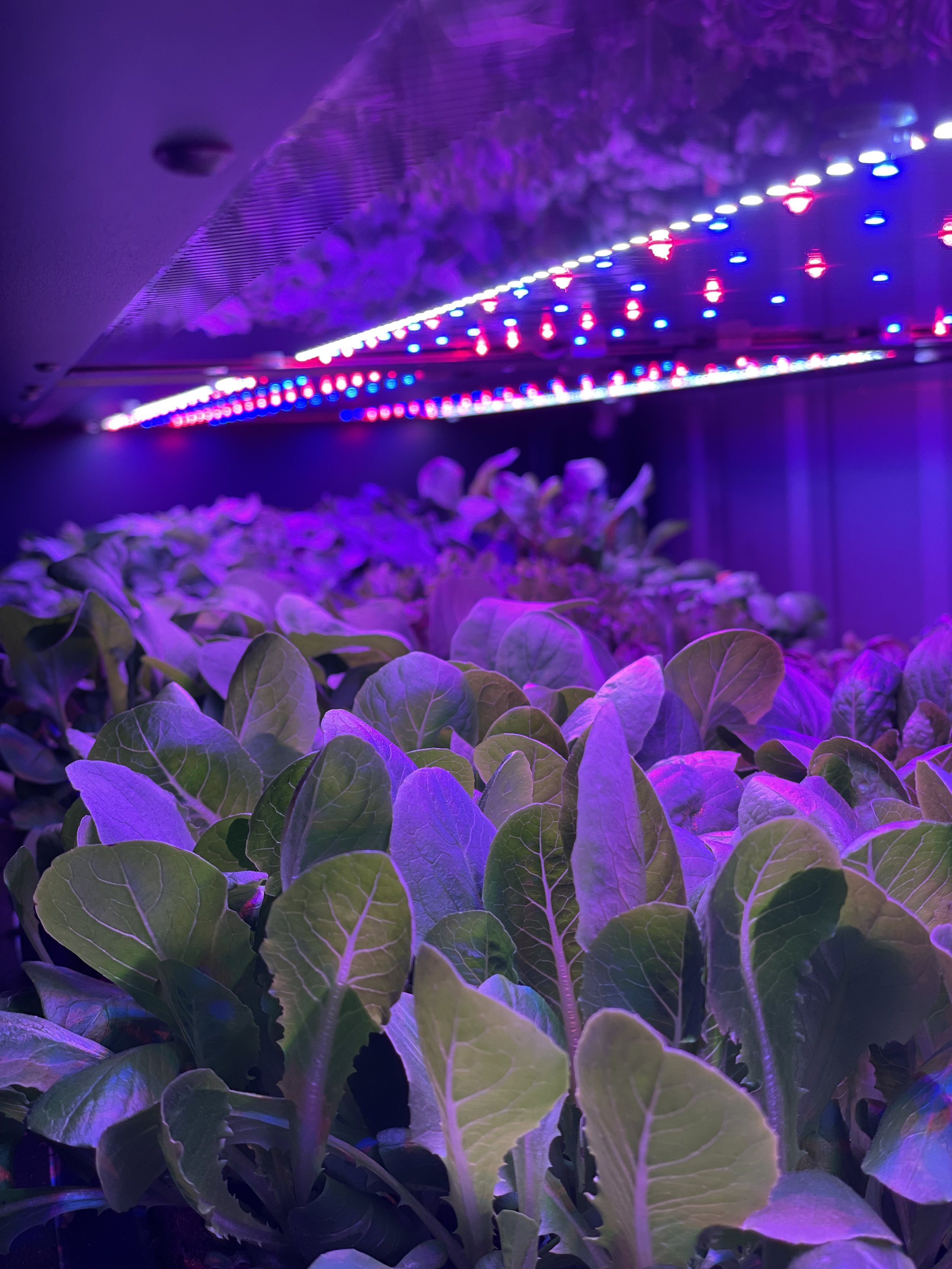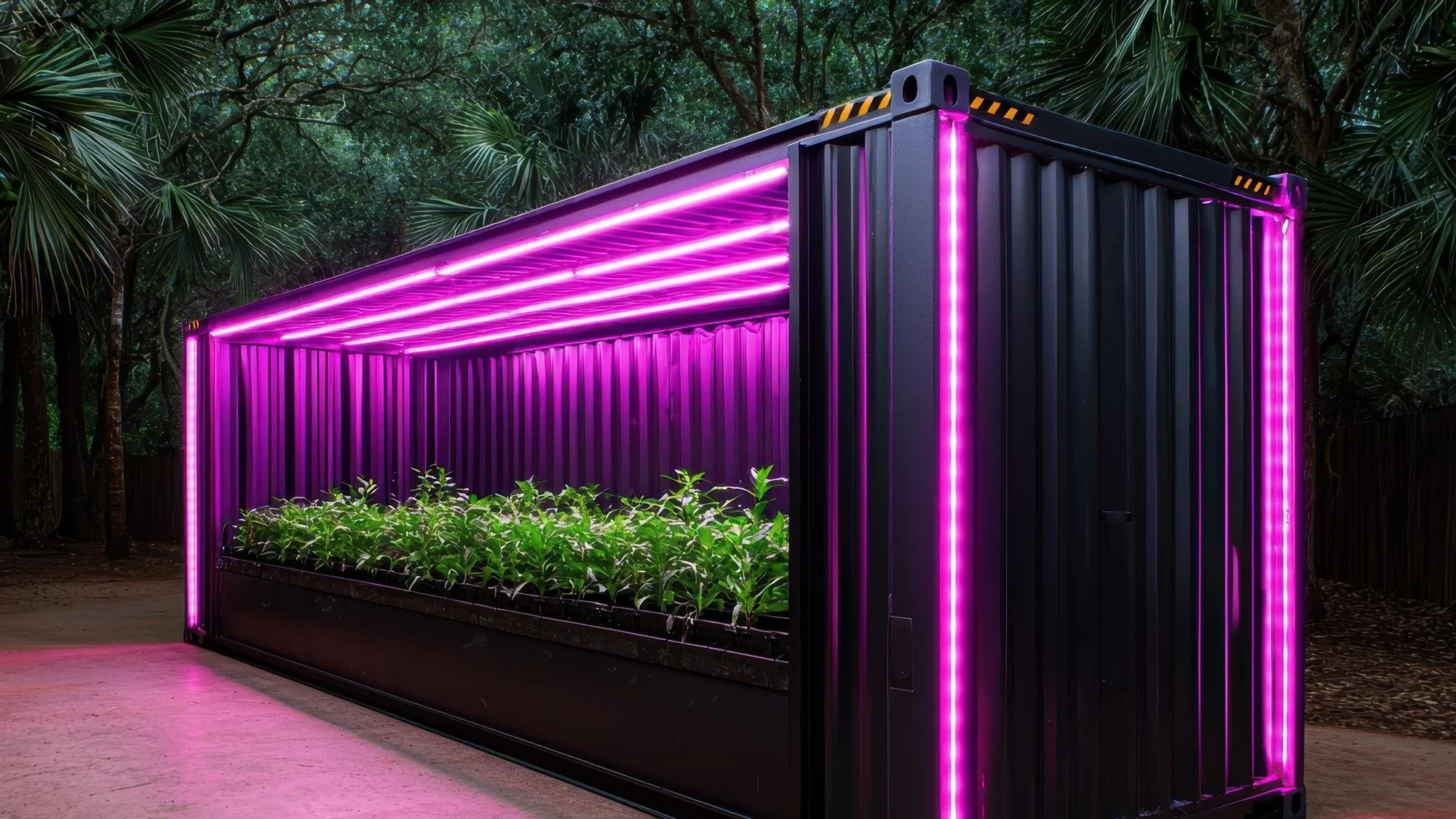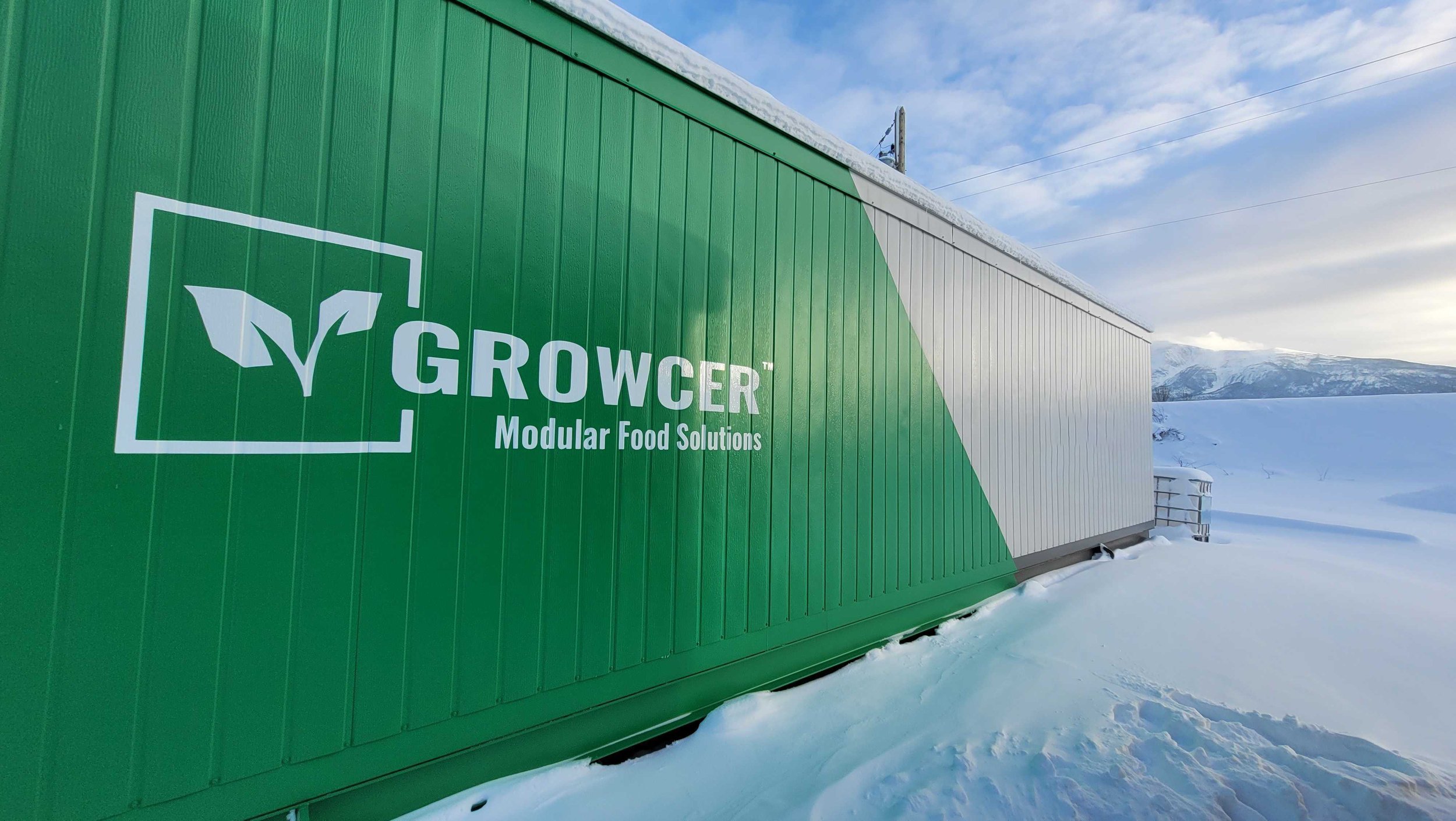
News About Farming in Shipping Containers & Limited Indoor Spaces
VIDEO: Freight Farms - Community Keynote: How Growcer Can Help + Survey
We’re actively supporting Freight Farms customers to keep growing. We’re working with current and former Freight Farms customers to create immediate and long-term solutions for your farm operations.
We are offering live support to chat through solutions and multiple support package options to help you move forward. Help us help you: Please take a minute to share your thoughts with us.
Your feedback will be used to build/source solutions that are relevant to where you need the most support.
What we need is a critical mass of farmers who are interested to unlock certain solutions so please signify your interest by taking the survey before the deadline.
USA - CALIFORNIA: Modoc High School Students Celebrate First Successful Hydroponic Harvest
Modoc High School AG students have officially completed their first harvest using a hydroponic tower installed in Mrs. Bickford’s (DeMoss) classroom. The tower was funded through a “Grants for Growing” project she applied for last fall.
“Luckily, they were awarded the grant to purchase the tower and supplies so that they could expose students to hydroponic systems and grow their own food beyond the Ag Dept. Greenhouse.”
At the start of the spring semester, horticulture students planted green leaf and romaine lettuce seeds into rockwool flats. “Being this was the first attempt with the tower, they only planted one tray of seeds so that they could understand how the tower and process fully works.” In photos, Josh Minto is seen watering the seeds, and Eliza Peña reads the seed packages to understand their growing requirements.
USA - MINNESOTA: Winona High School Students Harvest Lettuce Grown Inside The School
The students harvested nearly 50 pounds of fresh lettuce, grown inside the school using the Flex Farm hydroponic system from Fork Farms. Winona Area Public Schools says this is the first set-up of its kind in the state and allows Winona students to grow close to 200 pounds of fresh lettuce each month for the school's salad bar in the cafeteria.
Hydroponics is a method of growing plants in nutrient-rich water instead of soil and Winona Area Public Schools says it provides numerous benefits for student engagement, critical thinking, and problem-solving skills by combining hands-on experimentation in real-world farming scenarios. FFA Officer & Farm Manager, Miriam Jackson, and school's nutrition staff have been maintaining these Flex Farms learning valuable lifelong skills as they test pH levels, manage nutrient levels, and examine crop cycle management.
King Tide Farms
I am a 3rd generation farmer so farming is in my blood. After college, I began working in the agricultural chemical industry in row crops. Here I learned what it takes to feed a nation and the logistics of it all. This is where my journey began but not until 2019 while I was in the Bahamas helping rebuild after Hurricane Dorian that I realized what my path would be.
I have held every kind of sales position imaginable so I knew I was just looking for the right product to put my knowledge, skills, and abilities behind to make it a success. This is when I began looking into hydroponics farming and more specifically Controlled Environment Agriculture(CEA). We are located in Charleston, SC which provides long growing seasons but unfortunately, land close enough to cities to sustain a profitable business is just unaffordable.
USA - KANSAS: Leafy Green Farms: A Farm in a Box
Brad Fourby is not your average Pittsburg, Kansas farmer.
While he’s harvested hundreds of heads of lettuce and produce on his farm, he rarely does so under the Kansas sun or on a John Deere tractor.
Instead, this native Californian turned Kansas farmer spends his time growing produce inside his 320 square-foot indoor hydroponic farm, Leafy Green Farms.
But what exactly is hydroponic farming?
In simple terms, hydroponic farming is the process of growing crops with water-based nutrients rather than soil. Instead of planting crops out in a field, hydroponic farming utilizes a controlled environment approach to agriculture, meaning the environment in which the crops are grown is managed to optimize growth and resources in a setting where variables like temperature, humidity, and light can be controlled.
From Seed to Capitol: The Journey of a Flex Farm
The Wisconsin Department of Public Instruction recently embarked on an exciting journey with its new Fork Farms Flex Farm hydroponic grow tower. On January 13, 2025, the first lettuce seeds were planted, which were ready for transplanting into the tower by February 3. Throughout February, the seedlings grew into mature lettuce, and by March 3, the first harvest was ready! The freshly grown lettuce was served at the WI DPI School Nutrition Team’s monthly meeting and potluck—where it received rave reviews.
The hydroponic adventure didn’t stop there! The lettuce regenerated throughout March and on March 31, the Flex Farm was showcased at the Wisconsin State Capitol for a special Farm to School event. Visitors were invited to explore the grow tower and take home free lettuce and bean seed packets, branded with the Wisconsin Farm to School logo.
CANADA: Red Deer Food Bank Providing More Fresh Produce With Second Hydroponic Shipping Container Farm
A second hydroponic container farm is now fully operational and growing food for Red Deer Food Bank's clients.
The hydroponic sea can was reconfigured to grow a wider selection of vegetables and since January it has produced lettuce, Swiss chard, kale and bok choy.
"We really do have a variety of fresh produce items that are available each and every week now, and we're just getting more and more," said executive director Mitch Thomson.
"We've had huge uptake. For people with different birth origins, they've been really excited about this big, beautiful bok choy we've been producing."
The food bank now has four hydroponic systems to grow produce in two indoor growing areas and two container farms. Food was also grown in its outdoor green house during the winter where recently spring crops were planted.
Hydroponic Farming At Sea – MSC Cruise Lines and Babylon Micro-Farms Partnership Create a World First
The 6,762-passenger MSC World EuropaⓇ currently docked in Doha, Qatar is introducing a new restaurant concept, branded the Chef’s Garden Kitchen, which is a Babylon Micro-FarmsⓇ powered hydroponic garden at sea with herbs, greens and garnishes grown onboard.
Michelin-starred chef, TV personality and author Niklas Ekstedt has collaborated with MSC Cruises to design the menu for the specialty restaurant Chef’s Garden Kitchen, focussing on the natural ingredients and a farm-to-ocean ethos. Born in Sweden, the son of a produce seller, Niklas Ekstedt began his strong connection with nature and the Earth’s flavours at a young age. This new restaurant will feature the first-at-sea hydroponic micro-farm in the world and guests will be treated to a uniquely immersive experience with the master chef preparing Ekstedt’s extraordinary creations in an open kitchen against a backdrop of panoramic sea views.
INDIA: Hotel in Gurugram Adopts Hydroponic Cultivation for In-House Dining
The Leela Ambience Gurugram Hotel and Residences has launched The Green House, a hydroponic glass house developed to support its sustainability objectives and strengthen its farm-to-table practices. Located within the hotel premises, this initiative brings hydroponic farming into the core of the property’s food sourcing strategy.
Hydroponics is a method of growing plants without soil, using a water-based nutrient solution to deliver essential minerals directly to the plant roots. With this setup, the hotel is now producing fresh vegetables and herbs on-site, including lettuces, tomatoes, and aromatic herbs, which are used in its kitchen.
This initiative is designed to reduce the environmental impact of food sourcing while providing guests with direct visibility into the origins of their meals. Produce grown in The Green House is used in the preparation of various dishes, reinforcing the hotel's focus on traceability and freshness in its culinary offerings
Illinois State's Cilantro Will Soon Be Grown on Campus, Inside New Vertical Farm
The farm, which officially launched Thursday, will operate out of a converted shipping container outside ISU’s Office of Sustainability on School Street. The 320-square-foot unit is equipped with hydroponic system and LED lighting to grow the equivalent of 1-2 acres of traditional field production with a fraction of the water required to grow up to 4,600 plants.
Taco Tuesdays at Illinois State University are about to get fresher as a new Vertical Farm prepares to grow cilantro for dining services.
Professor of Agriculture David Kopsell gives a tour of ISU's new Vertical Farm. The converted shipping container is expected to produce 50 pounds of cilantro per week for campus dining services.
ISU’s New Vertical Farm Makes Most of Small Space
When it comes to making the most of small spaces, owners of tiny homes would be impressed with what Illinois State University (ISU) can do with its modified shipping container farm.
In its new 320-square-foot vertical farm, ISU will be able to produce as many herbs annually as it could in 2 to 4 acres in an outdoor field.
It all started in 2019 when a group of ISU students in the Innovative Consulting Community (ICC) approached horticulture professor David Kopsell about growing a garden for their entrepreneurial project. He explained how hard that would be during an academic school year and offered another alternative — a Freight Farm container hydroponic system.
“I had heard about Freight Farm since 2013 when some of my colleagues started talking about them,” said Kopsell. Through much collaboration, that idea germinated and grew to the point it will be ready to start growing leafy greens this summer.”
MINNESOTA: Route1 - Growing Food, Feeding People, Connecting With The Earth
The morning sun casts long shadows over the fields as farmers swiftly load crates of freshly harvested produce onto a waiting distribution truck. The scent of damp earth and ripened vegetables fills the crisp Minnesota air. A rhythmic chorus of voices calls out orders as hands pass boxes from one to another, each filled with vibrant greens and fragrant herbs. The truck’s reverse alarm beeps steadily, a signal of movement and progress.
Standing at a distance, Marcus Carpenter watches with quiet satisfaction. His dream, Route1 — born from a time of crisis and a deep-rooted passion for agriculture — has manifested before his eyes. The food will soon be on its way to those who need it most, carrying a message of resilience and empowerment.
How Shipping Containers Are Shaping Urban Vertical Farming
Our global food systems are under siege, with climate change, natural disasters disrupting supply chains, and conflicts affecting agriculture in vulnerable regions. Add to that a booming population—set to reach nearly 10 billion by 2050—and the math becomes startling. Experts predict we’ll need 70 per cent more food to sustain humanity.
But, here’s the problem – soil quality is deteriorating fast, and we’re on track to lose most of the fertile ground we rely on. Traditional farming methods, while vital, seem ill-equipped to meet the challenge alone.
Urban vertical farming has emerged as an innovative solution. By growing crops in stacked layers within highly controlled environments, these systems use less land, water, and pesticides, with shipping containers offering a sustainable, space-efficient answer to the global food crisis.
University of Evansville Launches 'We Grow Aces!' To Tackle Food Insecurity With anu, eko Solutions
The University of Evansville in Indiana is launching We Grow Aces!, a new initiative that brings together education, sustainability, and community engagement to provide access to extraordinary experiential learning, while addressing food insecurity and workforce development.
The program, funded through the Eli Lilly Endowment's Indiana Youth Programs on Campus grant, will make possible the purchase of a Pure Produce Container, a vertical garden system jointly developed by anu and eko Solutions, housed in an up-cycled shipping container capable of producing 3,920 plants per 40-day cycle, or several tons of vegetables annually.
Thanks To Hydroponics, Fresh Veggies Grown On Board Merchant Ships Are Heralding A Sea Change In Crew Well-Being
Addressing seafarers’ long-standing need for fresh vegetables as they undertake long voyages across oceans, shipping companies have for the first time installed technology-driven vegetable growing units on board merchant ships. The move has ushered in a quiet revolution in the maritime world, transforming both the meals and morale of the crew.
“It’s been a game changer for us at sea. The units ensure a continuous supply of fresh greens, requiring minimal maintenance from the crew while significantly enhancing onboard nutrition. For vegetarians, especially, this is a breakthrough — fresh salads and herbs have always been a luxury on long voyages, as I have witnessed first-hand over the last 30 years of my career at sea,” said Captain Rajesh K Verma, Master of the Synergy Marine group-managed Aframax tanker ‘Effie Maersk’. Four of Synergy’s merchant ships – 90 per cent of its 28,000-plus seafarers are Indian – had these hydroponics units installed last year.
Day Coming When Sushi Chefs Use Wasabi From Nearby Modules
Wasabi grown on shelves in a shipping container and in the Yokohama area to boot? And delivered straight to sushi chefs working nearby?
Not likely, purists might shout, thinking that Japanese horseradish can only flourish in mountain areas with pristine rushing water.
Going against the traditional image, a specialized factory module in Shin-Yokohama boasts the latest in sensing technology to ensure cultivation conditions remain perfect 24/7.
The operator is looking to pitch an autonomous system based on artificial intelligence (AI) at some point to maximize production.
Using a container for farming is the brainchild of Tokyo-based agricultural start-up Nextage Inc. With technical support from semiconductor trading firm Macnica Inc. in Yokohama, Nextage has begun selling the agricultural module in the Japanese market.
CANADA: Hydroponic Farm Project Coming to Prairie River Junior High
We are thrilled to announce a new agriculture project that will bring hands-on, sustainable learning to our students! In partnership with The Growcer, a Canadian agritech company specializing in year-round modular farms, we will be deploying a hydroponic farm at Prairie River Junior High School.
This innovative, climate-controlled system will allow students to grow food in all seasons, ensuring a consistent supply of fresh, nutritious produce for our community. In addition to gaining valuable knowledge about food security and agricultural technology, students will develop critical skills in teamwork, responsibility, and environmental stewardship.
VIDEO - USA - St. Louis, Missouri - Video: Neon Greens Restaurant Offers Fresh Take on 'Farm to Table'
Thanks to hydroponics, Neon Greens is bringing a fresh take on farm to table by farming along Manchester Road.
The vertical vegetable farm is located right next door.



















